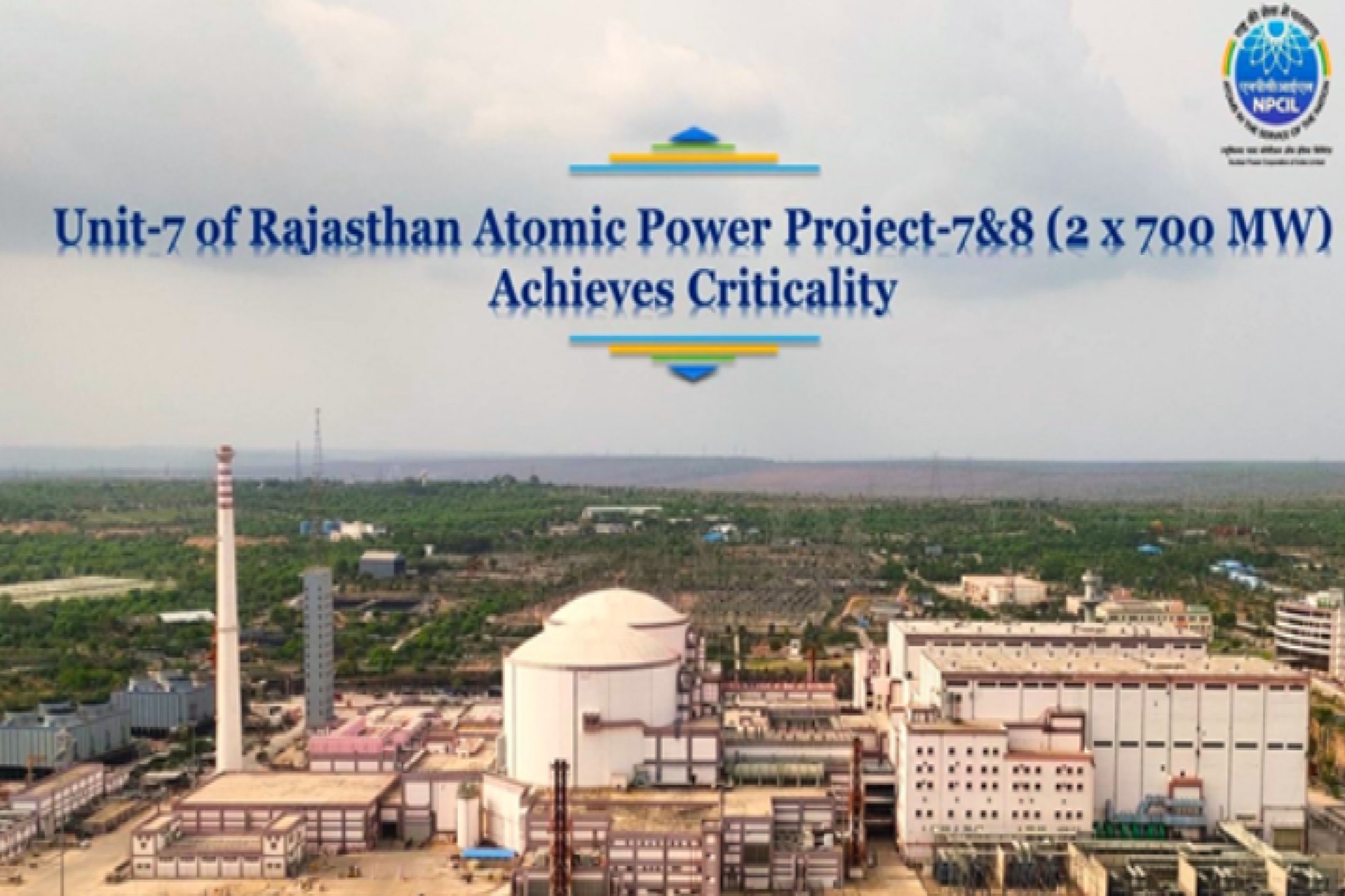Rajasthan Atomic Power Project Unit-7 achieves nuclear advancement
By Staff Report September 30, 2024 2:10 pm IST
By Staff Report September 30, 2024 2:10 pm IST

The milestone underscores India’s commitment to sustainable energy and strengthens its position as a leader in nuclear technology, ensuring a cleaner and more secure energy future.
In a significant step forward for India’s nuclear energy ambitions, Unit-7 of the Rajasthan Atomic Power Project-7 & 8 (RAPP-7&8, 700 MW each) achieved a significant milestone on September 19, 2024, at 9:42 pm, by reaching criticality, marking the start of a controlled nuclear fission chain reaction. This achievement is particularly notable as India continues to balance its growing energy needs with its commitments to reducing carbon emissions. This achievement follows the Atomic Energy Regulatory Board’s (AERB) clearance for the First Approach to Criticality.
Understanding criticality
Reaching criticality in a nuclear reactor refers to the point at which a sustained and controlled nuclear fission chain reaction begins. At this stage, the number of neutrons produced by fission events is equal to the number of neutrons lost through absorption and leakage, resulting in a stable level of power output. This is a crucial milestone in the reactor’s operational cycle, as it marks the transition from the construction phase to the operational phase. Achieving criticality is essential for the reactor to start generating heat, which can then be converted into electricity, thereby contributing to the overall energy supply. The safe management and precise control during this process are vital to ensure the reactor operates within designed safety parameters.
Overview of RAPP-7
Located in Rawatbhata, Rajasthan, RAPP-7 is a 700 MWe Pressurised Heavy Water Reactor (PHWR), and the third unit in a series of sixteen indigenous reactors being developed in India, a testament to India’s growing expertise in nuclear technology. The RAPP project, owned and operated by the Nuclear Power Corporation of India Limited (NPCIL), plays a pivotal role in India’s energy security. With RAPP-7, the Nuclear Power Corporation of India Limited (NPCIL) continues to advance its capabilities in the design, construction, and operation of nuclear power plants. This unit follows the successful operation of Kakrapar Atomic Power Station-3 & 4 (KAPS-3 & KAPS-4, also 700 MW units each) at Kakrapar in Gujarat, demonstrating the maturity and reliability of India’s nuclear technology.
The RAPP-7&8 project, with a total planned capacity of 1400 MW, adds to the existing six operational units at Rawatbhata, which contribute 1180 MW to the grid. RAPP-7 is expected to commence power generation later this year, with RAPP-8 slated for the following year. NPCIL currently operates 24 reactors with a total capacity of 8180 MW and has eight units, including RAPP-7, with a capacity of 6800 MW under construction. An additional ten reactors, totalling 7000 MW, are in the pre-project stage, projected to be completed progressively by 2031-32.
Next steps for RAPP-7With the completion of the construction phase, RAPP-7 is now transitioning to its operational phase. Following the achievement of criticality, a series of experiments and tests will be conducted to ensure optimal functioning before the unit is connected to the grid. Power levels will be gradually increased in accordance with the AERB’s clearance until full power generation is achieved. Once fully operational, Unit-7 will contribute significantly to the national grid, providing clean and efficient energy to meet the growing demands of industries and households alike.
A leap towards clean energy
India’s nuclear energy programme is a vital component of its strategy to achieve a low-carbon economy. With the country’s goal of reaching 500 GW of non-fossil fuel energy by 2030, nuclear power stands as a reliable and scalable option. Nuclear energy, being a zero-emission source of power, helps reduce reliance on coal and other fossil fuels. The criticality of RAPP Unit-7 is a crucial step towards meeting these energy and environmental targets.
The Department of Atomic Energy (DAE) and NPCIL have been working relentlessly to ensure the timely progress of the project. With this milestone, India takes another leap forward in enhancing its domestic power generation capabilities while reducing its carbon footprint.
The criticality of the Rajasthan Atomic Power Project Unit-7 signifies more than just the operational readiness of a reactor; it represents India’s growing prowess in nuclear technology and its commitment to a sustainable energy future. As the nation progresses towards its energy goals, RAPP Unit-7 will stand as a symbol of innovation and a cleaner tomorrow. The successful achievement of criticality at RAPP-7 not only strengthens India’s energy security but also highlights the progress made in the field of nuclear power generation, reinforcing the country’s position as a leader in nuclear technology.
We use cookies to personalize your experience. By continuing to visit this website you agree to our Terms & Conditions, Privacy Policy and Cookie Policy.